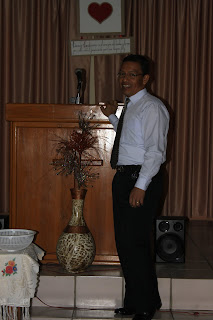Thursday, July 22, 2010
What a journey! Today we traveled from metropolitan Quito, 9,500 feet above sea level, to Tosagua, a rural town near the coast. We bumped and careened our way down inferior roads for hours, as we soaked up the novelty of Ecuadorian culture. At one point, we followed behind some cowboys driving cattle down the middle of the road!

Riding on the edge of a cliff much of the way, we arrived at Tosagua around 5:00 pm. God is good.
Most of what we passed was farmland with cattle, goats, donkeys, horses, chickens, geese, corn, sugar cane, tomatoes and a few empty rice wetlands. Growing (apparently) wild, cultivated in fields and planted in the tiniest yards, banana and papaya trees were abundant. Hammocks hung under houses, on tiny front porches and between trees.
All along the road were houses. Scores of them were built on stilts, even when water was nowhere in site – perhaps to discourage bugs or supply shade and storage for people or animals. Nearly every house we passed was in deplorable condition, many with no windows or doors. A few had beads or a curtain hanging where a front door should have been and curtains in glass-less windows. Countless homes had bars over the windows, glassed or otherwise, as security is an issue even in rural Ecuador. It is noteworthy that the houses lack uniformity – they might be roofed or sided with several different materials, as if they ran out of one thing and were forced to make do with something else. Even brick houses are often not uniform – being part brick, part cinder block and part something else. Incidentally, it was impossible not to notice Ecuadorians don't use a level to lay cinder block or brick. This is true in Quito as well.
Almost every house had clothes hanging outside, sometimes on a clothesline, sometimes over a fence or porch railing. (This was also common in Quito, even with the nicer homes.) One family was outside washing laundry in tubs, as we passed by.

Many times I would spy a ramshackle shed or barn and focus my camera on it, only to find out, as we approached, a family was living there. I have never seen such abject poverty. Indeed it is impossible to convey or comprehend
and yet these families live…
I don't know what I expected upon arrival in Tosagua. I know my expectations were decreasing by the minute as we drove along. Reading the Bienvenidos a Tosagua sign prominently displayed at the edge of town, I seriously began to consider our lodgings.

My relief was palpable when our bus driver slowed to a stop in front of a lovely hotel right in the middle of town. We're staying at the Hotel Punta de Oro and the rooms are quaint and charming. In most cases, we are 2 to a room, with en suite bathrooms. Ashley and I each have our own bed, covered in old white linens with embroidered pillowcases and lacey white mosquito nets hanging overhead.

The walls are a charming periwinkle blue, as are the tiles in the bathroom. Our rusty shower head is equipped with a widow maker, a way to harness electricity in the water pipe to heat water; but it isn't hooked up and doesn't heat water… I know this because I can see the loose wires hanging out above the shower head.

Needless to say, I won't be considering the implications of mixing water with electricity in the morning as I hurry through a cold shower and thank God for running water.
We were given free time before dinner to walk around town in groups of 3 or more. A few of us headed to the open market to look at picturesque fresh produce and the Faramacia to buy some anti-itch cream for somebody's mosquito bites. We endeavored to absorb the sights, sounds, and smells of a town that in many ways seems as if it's living in another century.
Here's a view of a major intersection from our patio-furniture-ready rooftop terrace...

A view of the open market from our roof-top terrace...

At 7:00, we enjoyed white rice and grilled chicken for dinner with peach juice in the hotel restaurant, then spent several hours packing supplies for the next few days of screenings. After that, I headed upstairs to my room to do homework and, with no internet access in the hotel, went to bed earlier than I have since we arrived in Ecuador.


















































